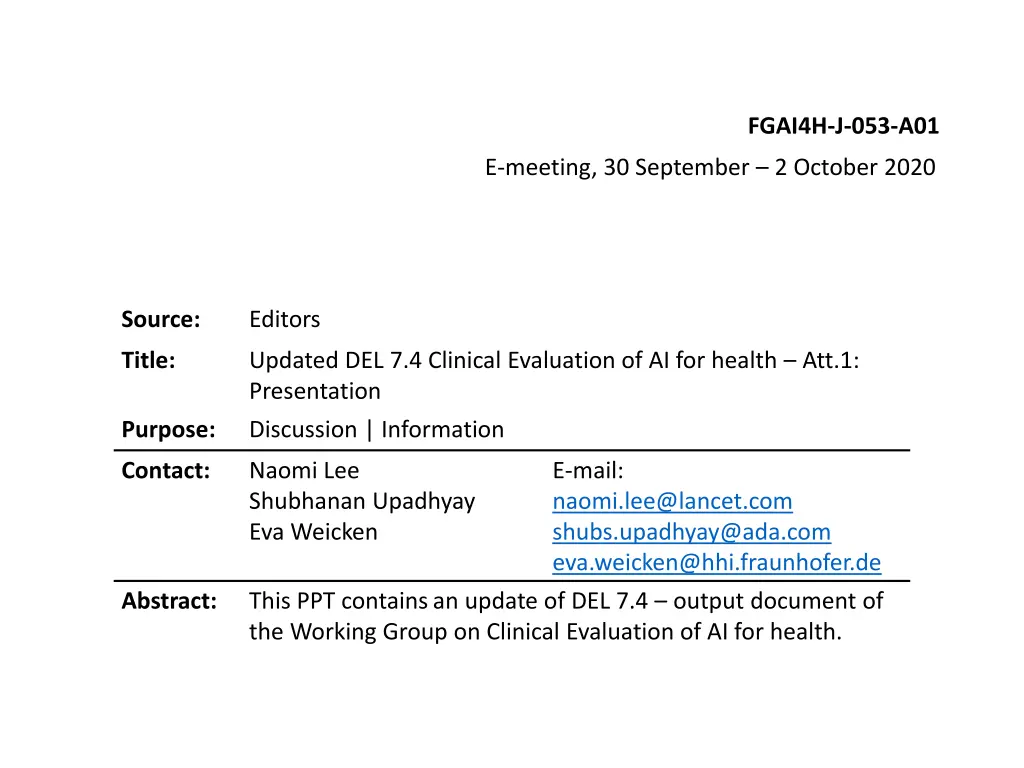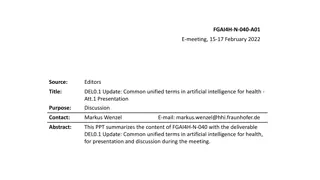
Clinical Evaluation of AI for Health Stakeholders
Explore the importance of benchmarking, specific evaluation issues, and current frameworks in the clinical evaluation of AI for health stakeholders. Learn about upcoming workshops and next steps in this field.
Uploaded on | 1 Views
Download Presentation

Please find below an Image/Link to download the presentation.
The content on the website is provided AS IS for your information and personal use only. It may not be sold, licensed, or shared on other websites without obtaining consent from the author. If you encounter any issues during the download, it is possible that the publisher has removed the file from their server.
You are allowed to download the files provided on this website for personal or commercial use, subject to the condition that they are used lawfully. All files are the property of their respective owners.
The content on the website is provided AS IS for your information and personal use only. It may not be sold, licensed, or shared on other websites without obtaining consent from the author.
E N D
Presentation Transcript
FGAI4H-J-053-A01 E-meeting, 30 September 2 October 2020 Source: Editors Title: Updated DEL 7.4 Clinical Evaluation of AI for health Att.1: Presentation Purpose: Discussion | Information Contact: Naomi Lee Shubhanan Upadhyay Eva Weicken E-mail: naomi.lee@lancet.com shubs.upadhyay@ada.com eva.weicken@hhi.fraunhofer.de Abstract: This PPT containsan update of DEL 7.4 output document of the Working Group on Clinical Evaluation of AI for health.
Why? Benchmarking: measuring comparative performance of AI tools Clinical stakeholders: So What? Utility, Impact Outputs: Bring together expert clinicians and academics Deliverable 7.4 Input to each TG on big picture considerations Where does benchmarking fit in overall terrain of Clinical Evaluation?
Spectrum of Clinical Evaluation One possible approach
Specific issues Phases of evaluation Efficacy and comparative efficacy Safety Generalisability/Bias and Inclusiveness Evaluation adaptive/learning models Reporting of evaluation (following EQUATOR) Clinically meaningful endpoints Post deployment surveillance (overlap with regulation) Specific considerations for low- and middle-income settings Collaboration and engagement
Draw on current evaluation frameworks EQUATOR CONSORT AI and SPIRIT AI reporting guidelines IMDRF SaMD: Clinical Evaluation Strong examples: Digital health scorecard, Model facts labels
Model facts labels Sendak, M.P., Gao, M., Brajer, N. et al. Presenting machine learning model information to clinical end users with model facts labels. npj Digit. Med. 3, 41 (2020)
Work to date Update Working group on Clinical evaluation ToRs Deliverable 7.4 (version 2) 20 members by Sept. 2020 Workshop on Clinical Evaluation, 14 Oct 2-6 pm CEST
Next steps Online Workshop on Clinical Evaluation 14 October 2020, 2-6 pm CEST Register here: https://itu.zoom.us/meeting/register/tJMsdu2qrj4sHdFp-4N- RH4tmopJOPBL7hh3
See you at the Clinical Evaluation Workshop 14 Oct Join us! Co-chairs: Naomi Lee, Lancet Shubhanan Upadhyay, Ada Health GmbH Eva Weicken, Fraunhofer HHI Please contact: eva.weicken@hhi.fraunhofer.de


